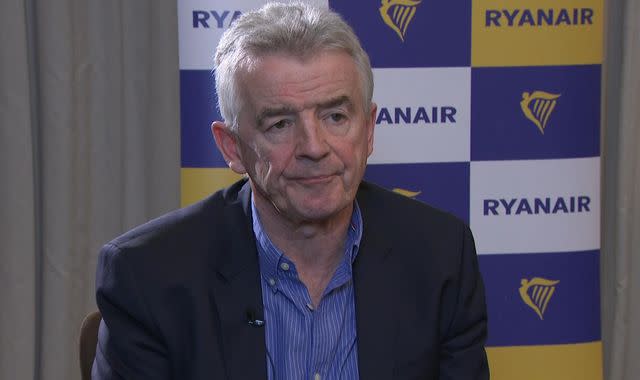Ryanair boss declares passengers are safe despite Boeing issues

Ryanair's chief executive has insisted passengers are safe in its fleet of Boeing aircraft after he raised questions about quality control at the plane manufacturer.
Speaking to Sky News following the Alaska Airlines accident that saw a fuselage panel blow out of a 737 MAX 9, Michael O'Leary said he was sending a team of engineers to oversee production of 57 aircraft he has on order, and his customers should be reassured.
"We don't fly the MAX 9 so the issue doesn't apply, there's none of those aircraft in Europe.
"Boeing make great aircraft. The 737 is the most audited aircraft in history, it's the oldest and most secure plane in the air, we're very proud to fly them and we've had no kickback or pushback from passengers flying on our aircraft."
Mr O'Leary said Ryanair will double the number of engineers it has on the ground at production facilities in Wichita, from four to eight, and Seattle, from six to 12, following a request from Boeing, as well as increasing those inspecting their own planes.
A Ryanair team met senior Boeing management including under-pressure chief executive Dave Calhoun in Seattle last week, and told them they had concerns over quality control.
Mr O'Leary said he retained full "faith and confidence" in Mr Calhoun but wanted to see improvement in quality control that in the past had seen planes delivered to Ryanair with "a spanner under the floorboards", and items left in the hold.
He said Boeing had doubled the number of its own engineers on production lines after concerns raised by the failure of a door "plug", that blew out at 16,000 feet apparently because four bolts had not been secured.
"I have a lot of confidence and time for the work that Dave Calhoun and Brian West, the chief finance officer, have done over the last two years. I think they've made very significant improvements," he said.
"But there's more to do. Ryanair sent a team to Seattle last week, we've met with the senior management, they've asked us to put more engineers on the ground in Seattle, which we've agreed to do.
"And they've also committed to putting more engineers that are sitting on top of quality control and quality assurance as the aircraft come off the product or the production facility.
"It is not acceptable that aircraft come out of Wichita, or aircraft get delivered from Seattle with anything wrong with those aircraft, and they need to be checking that all the bolts are secure, that all the fasteners are in the right place and the holes are in the right place."
Mr O'Leary said he was encouraged that its most recent deliveries from Boeing had been "the best aircraft we've ever had from them", adding that he expects the grounding of the MAX 9s to be lifted as soon as next week as the US-wide inspection process is completed.
Ryanair has orders for a further 57 planes to be delivered this year but to date has received only seven from Boeing, and Mr O'Leary said a likely shortfall will hit its target of flying 205 million passengers this year.
"We think we'd be lucky to get 50 by the end of June, which is just in time for the peak summer this year. So there's no doubt we're going to be short some aircraft.
"Our plan was to grow this year to 205 million passengers, it's more likely to be 200, 201, 202, million. So we have to grow a little bit slower. But maybe that's a good thing in the overall context of the work that Boeing has to do on its assembly line in Seattle."
Mr O'Leary also rejected the British government's plan, announced in the King's Speech, to clamp down on "drip pricing", the practice whereby additional costs are added into consumer purchases.
Read more:
What is drip pricing and how can we resist it?
Boeing chief admits lapse in quality control after Alaska 'blowout' scare
Ryanair says any "ancillary" costs added on to ticket prices, for baggage or seat priority, are legitimate and transparent, and called on the prime minister to focus on online travel agents he accused of "scamming" customers.
"What [Rishi Sunak] should be tackling is the online travel agency scams that are going on where you have these people masquerading as price comparison websites, but then duping people into making bookings and getting overcharged for air fares and overcharged some cases by 200% or 300%. That could be eliminated before the next election."
He also called for the chief executive of National Air Traffic Control, Martin Rolfe, to be sacked following the air traffic control failure last summer, and described Brexit as "a disaster for the British economy" that made red tape in the UK more onerous than in Europe.


